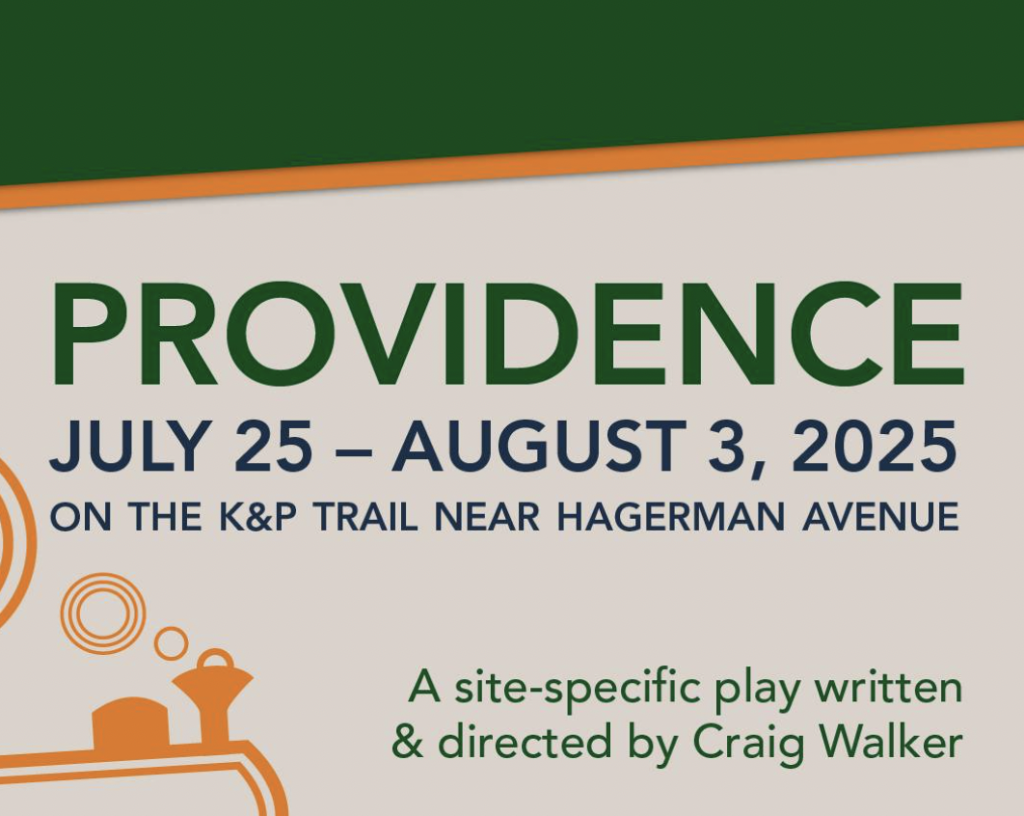An Actor’s Train of Thought: Behind the Scenes of Providence

Presenting a play outdoors on a piece of history during the summer is not your typical show, and it certainly does not come with your typical rehearsal process. This year, The Kick & Push Festival is presenting Eye of the Dawn Collective’s production of Providence by Craig Walker; a production which I have been fortunate enough to take a part in. It celebrates the 150th anniversary of the opening the Kingston Pembroke railroad (colloquially known as the Kick and Push, a moniker which the producing festival has claimed) by performing a fictional plot taking place the day before the railroad’s opening and is stuffed to the brim with actual facts from history. My opportunity to be working on this brand new site-specific show has presented a unique situation in which I can write about what it’s like to act in such a peculiar production.
The rehearsal process was to take place for the most part in Theological Hall at Queen’s University. Kevin Shaw, the production’s stage manager, had gone to the site of the actual tracks to measure them out and tape down their outline on the floor so that we could get a better idea of footing. We had our first readthrough there on July 7, 2025; just 18 days before we would be performing in front of audiences. Rehearsals continued there, but as the heat started to increase, the room slowly became unbearable. Eventually, Walker decided that for the benefit of the cast and crew’s health we would relocate rehearsals temporarily to somewhere with air conditioning: his basement. The space was smaller, and even beginning a rehearsal became a process as we moved furniture to create a playing area and Andrea Robertson (the show’s designer) corralled the dogs in the home to another space. Despite Shaw’s efforts to tape down an outline of the tracks to help us in each space, the constant changes in setting made it difficult to comprehend the playing area. Once we had moved to our first rehearsals on site we realized there was an entire upstage space behind the tracks that we had not been able to represent in the crowded basement, and so the spacing had to be entirely reconsidered for the performance to not feel two-dimensional.
Attempting to describe preparing for a site-specific show is a fool’s errand, as there is no way to predict what elements will come into play each night. On site there are cicadas buzzing, birds chirping, cars honking, gravel shifting, and a particularly unruly apple tree interfering whenever possible by hurling apples onto the stage. Outside the controlled environment of a theatre, actors have so much more noise to compete with and need to always use more projection. Depending on natural lighting also means the shows have to be relatively early so we can use the sun, but the 6:00 PM start time most evenings meant that the sun sat perfectly shining down on our eyes. The world’s spotlight is relentless and unforgiving as its wash not only blinds us but also makes the simple act of standing in historical costumes a trying physical feat. The final gift our location gives us to cope with is a lack of a backstage area. After clearing some weeds, our team managed to carve out a small space to wait offstage which is brimming with grasshoppers, ticks, and perhaps my favourite item: the wire frame of a mattress which had been burnt to a crisp at some point.
The difficulties of a site-specific rehearsal room in no way outweigh the benefits, especially for a show so firmly rooted in history. As I mentioned earlier, the play’s plot is fictional, but the show is still filled with factual information of the period. At one point in the piece Joe and Deirdre Molloy (Liam Karry and Dympna MacDonnell) are speaking with Alex Grant (Jake Henderson) regarding a pair of brothers who had a falling out in a land dispute. One early rehearsal, Walker pointed out that these “Cassidy brothers” were an actual pair he had come across the history of in his research, and so he included details of the dispute and the aftermath in his story. Having him in the room as both director and playwright was beyond helpful, because he was able to provide insights into his research and choices he had made in the script. Another small example is the characters in the play refer on multiple occasions to “The Grimason House”—the place where the railway workers went for drinks the previous night—and that pub was an actual location in Kingston which still exists today as the Royal Tavern. The amount of this city’s history packed into this show demands to be brought to life by the city that inspired it, and so although they presented a multitude of new issues, arriving at the tracks for the first time felt vital to the life of the show.
Every rehearsal and every show has presented unique challenges for us to overcome as a team. There are distractions all around the stage and while out there performing, it feels like nature is trying to put an end to the show. But I’m fortunate enough to have a lot of time offstage in the script where I can take a moment to sit and watch, and the lighting that seems so harsh when standing in it suddenly seems to bathe my castmates in glorious gold. The tracks which burn my hands as I sit are a piece of history we are fortunate enough to tread upon. The animal’s noises which distract me underscore the spoken text. There is a life that—try as we might—could never be replicated in a traditional space. It is one of the most gruelling jobs I have had the chance to tackle as a performer, but the individuality and liveness of the environment and history make it easily one of the most rewarding.
Find information about more shows in The Kick & Push Festival here. Read more about the performance of ‘Providence’ here.
